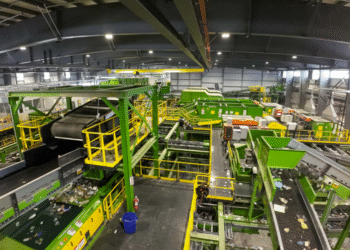A Canadian group’s study of Digimarc Recycle’s digital watermark showed that it does in fact improve accuracy for sorting flexible plastic packaging.
The pilot project, which was the first test of the system in North America, was carried out by the Circular Plastics Taskforce (CPT), Pellenc ST and converters that had signed on to help the research effort, according to a press release. Previously, the technology underwent large-scale sorting assessments over the last year in Europe, including the HolyGrail 2.0 assessment.
“Remarkably, the results show consistent behavior no matter the type of material used, the form factor or the type of comingled waste,” the press release stated.
Digimarc works by combining digital watermarks with a cloud-based database of product attributes, such as brand, SKU, product variant and packaging composition. The watermark can then be scanned to sort the material based on the coded information.
According to the press release, the accuracy of detection and sorting was 99% for films and flexibles, which satisfies the enhancement guidelines set by Digimarc.
“These results further confirm what has been validated in other programs: Digimarc Recycle is exceedingly effective in improving the accuracy of recycling sortation and provides an ability to sort material that current optical sorting technology cannot,” Riley McCormack, Digimarc CEO, said in the press release.
Given that level of precision, the CPT, which tests projects that can improve plastic packaging recycling in Quebec and throughout Canada, plans to start using the technology in facilities starting in 2023, “to enable the separation of flexibles by attributes, allowing the creation of new end-markets,” the press release noted.






























